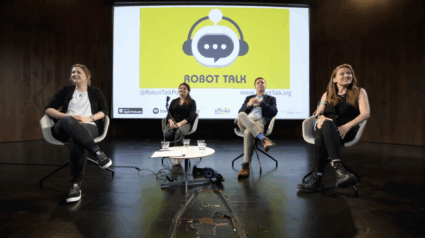
Robohub.org
Robot Talk Episode 90 – Robotically Augmented People

Robotics is helping to rehabilitate and increase human abilities in areas like mobility and stamina. Innovations in robotic devices, exoskeletons, and wearable tech aim to offer disabled people different perspectives and new experiences, as well as supporting humans more widely to access, inhabit and work safely in dangerous and extreme conditions. What does the future hold for these technologies and the people they will become a part of?
In this special live recording at the Victoria and Albert Museum as part of the Great Exhibition Road Festival, Claire chatted to Milia Helena Hasbani (Imperial College London), Benjamin Metcalfe (University of Bath) and Dani Clode (Cambridge University) about robotic prosthetics and human augmentation.
Milia Helena Hasbani is a researcher in assistive technology at Imperial College London. She is passionate about improving people’s lives through innovation in healthcare and technology in multi-disciplinary environments interfacing with engineers, clinicians, and patients. Her research focuses on the control of active prosthetic arms, combining user intention for wrist movements with a computer vision system for dynamically selecting the grasp type to be used.
Benjamin Metcalfe is a biomedical engineer who specialises in neural interfaces and implanted devices. He is Head of the Department of Electronic & Electrical Engineering at the University of Bath and Deputy Director of the Bath Institute for the Augmented Human. He is also Vice-President (Academic) of the Institute of Physics and Engineering in Medicine. His interests explore the collision between technology and biology and the extent to which engineering can be used to augment and enhance human performance.
Dani Clode is an augmentation and prosthetics designer. She is the Senior Technical Specialist at the Plasticity Lab at Cambridge University and a collaborator of the Alternative Limb Project. Dani’s work investigates the future architecture of our bodies, challenging the perception and boundaries of extending the human form. Her main project the ‘Third Thumb’ is currently being utilised in collaboration with neuroscientists at Cambridge University, investigating the brain’s ability to adapt to human augmentation.





